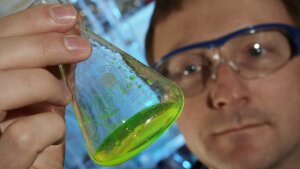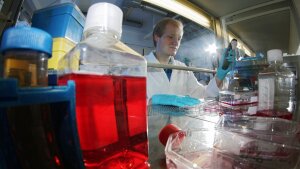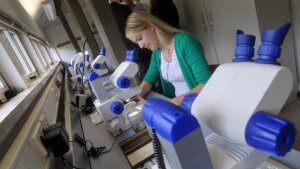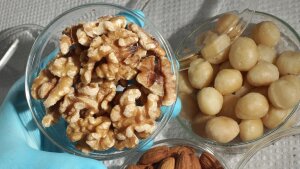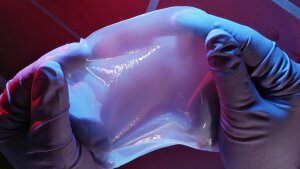
Biology (B.Sc. and M.Sc.)
Laborarbeit
Image: Jan-Peter KasperThe Bachelor's Degree in Biology consists of the branches chemistry, mathematics/ biostatistics, physics/ biophysics, zoology, botany, microbiology, cell biology, biochemistry, physiology, genetics and ecology. The first part of the study path (1st and 2nd academic year) is the same for all students. The second part (3rd academic year) allows all students - through a wide range of advanced modules - to specialize in a biological subdomain, to orientate towards a chosen occupational area or to focus on a consecutive master's program. The advanced modules can be chose from four areas of specializations: evolution, ecology and systematics, microbiology, molecular life sciences and neurosciences.
- B.Sc. Biologie de Bachelor of Science (Homepage BB) de
- consecutive master degrees
- Evolution, Ecology and Systematics Master of Science (Homepage MEES)
- Microbiology Master of Science (Homepage MMB)
- Molecular Life Sciences Master of Science
Biochemistry / Molecular Biology (B.Sc. und M.Sc.)
Laborarbeit
Image: Jan-Peter KasperThe University of Jena is one of the few German universities that offer very complex and highly specialized studies in Biochemistry/ Molecular biology. Due to the main focus on "molecular biology" the University of Jena sets a strong biological emphasis during the studies. Basis of the program is the scientific education in the fields of biochemistry, biophysics, experimental medicine, genetics, molecular biology, theoretical biology and cell biology. Furthermore, students will receive general education in the subjects of botany, microbiology, zoology, mathematics/ biostatistics, physics and in particular chemistry. The first part of the study path (1st and 2nd academic year) is the same for all students. The second part of the study path (3rd academic year) contains two basic modules "Biochemical and biological methods" and "Experimental medicine" and a wide range of advanced modules that allow students to orientate towards a chosen occupational area or to focus on a consecutive master's program.
- Biochemistry/Molecular Biology de Bachelor of Science - Single-subject bachelor (Homepage in German)
- Biochemistry Master of Science
Life sciences as a Supplementary subject (B.A.)
Mikroskopierpraktikum
Image: Jan-Peter KasperThe University of Jena offers students from a non-scientific major the rare opportunity to choose Life sciences as a Supplementary subject and thus to combine a humane or social discipline with a scientific subject. Thereby, the university reflects the fact that biological issues become more and more important in order to find answers for questions which affect society as a whole and in addition it accounts for the increasing importance of biological expertise in non-scientific fields. Thus, students are given the possibility to combine life sciences with subjects like sports science, education, philosophy or German studies. The subject life science conveys primarily the theoretical foundations of subdomains of modern "life sciences" with particular social relevance. For the study of the supplementary subject life science you can choose five modules fitting your interests. You can select modules from the following fields: zoology, botany, ecology, microbiology, genetics, bioinformatics, biochemistry, food science and pharmacy.
- Biological Sciences de Bachelor of Arts - supplementary subject
Supplementary subject History of Science (B.A.)
Historische Exponate
Image: Jan-Peter KasperThe Bachelor's Supplementary subject History of science provides the ability to a critical historical and methodological reflection on academics in general and science in particular. Therefore, the subject can be combined with a wide range of majors. The challenge and appeal of the subject is the border crossing between disciplines, since the object of this field are the sciences, but the procedure is based on historical, cultural-scientific and sociological methods. The research focus of the Institute history of medicine, science and technology "Ernst-Haeckel-Haus" lies on the history of science since 1800, the history of biology and contemporary history. Picking up on the idea of the unity of research and teaching, the course is based on the entire width of the natural sciences ranging from antiquity to the 20th century with a particular focus on the history of life sciences and physics.
- History of Life Sciences de Bachelor of Arts - supplementary subject
Nutritional Sciences (B.Sc. und M.Sc.)
Nahrungsmittel
Image: Jan-Peter KasperFood science (trophology) is a complex subject which is focused on the proper nutrition in order to preserve and strengthen human health and performance as well as the metabolic processes regarding human nutrition. Trophology - as opposed to ecotrophology (nutritional combined with domestic science) - is a scientific subject. Nutritionists work on a multi-disciplinary scientific foundation in order to solve problems on a molecular, cellular and organic level. On the basis of a comprehensive scientific and biomedical education they gain knowledge on the interdisciplinary field of nutrition which has a biochemical and molecular biological background. This background includes the fields of physics, mathematics, biostatistics, chemistry, molecular/ micro and human biology, hygiene, nutrition physiology, bio-/ food chemistry, human nutrition and food technology.
- Nutritional Sciences de Bachelor of Science - Single-subject bachelor
- M. Sc. Nutritional Sciences
Pharmacy (State examination)
Vlies aus Nanozellulose
Image: Jan-Peter KasperPharmacy is the science of drugs. The focus of the subject is the development, manufacturing, testing, storage, distribution and risk assessment of pharmaceuticals as well as the information and consulting on pharmaceuticals in the area of health care. In addition, historic, legal and clinical aspects are taught. Both the training and the practice of the pharmacist profession are regulated by the licensing regulations for pharmacists (AAppO). The university studies lead to the state examination, additional to that the one interested in research can aim for the diploma. The studies contain the five major areas pharmaceutical/ medical chemistry, pharmaceutical biology, pharmaceutical technology, biopharmaceutics, pharmacology/ toxicology and clinical pharmacy. The course is split into two study periods (with a duration of two years each). After four semesters, which include a pharmacy-orientated basic scientific training on chemistry, pharmaceutical biology, physics, drug morphology, physiology and pharmaceutical analytics, the first section of the pharmaceutical examination takes place. During the second part you will learn to develop, produce, examine and evaluate drugs. The second part is finished with the second section of the pharmaceutical examination.
